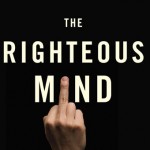 Some funny things happened to me while listening to the Audible recording of Twilight of the Elites by Chris Hayes.
Some funny things happened to me while listening to the Audible recording of Twilight of the Elites by Chris Hayes.
You can get it here on Amazon and here on Audible.
First, while listening I felt like I was riding the Coney Island Rollercoaster while simultaneously watching in 3D and listening in surround sound to Billy Joel’s “We Didn’t Start The Fire.” It could have been: too much coffee; listening while on the treadmill; or Hayes’ New York speaking cadence.
If you recall, I suggest while listening to audio books you increase the narrator’s speed to 3X or three times the normal reading pace, so you can read more books. With most narrations, you can easily pick up what the narrator is saying and not miss anything. But since Hayes, who narrates his book, is a native New Yorker, he speaks so fast, you need to lower the pace.
Second, I was surfing the news rollercoaster, known as Twitter, when I came across a review of Twilight of the Elites. I don’t remember who tweeted it. The tweet said the book was good, but Hayes failed to offer any specific solutions to the problems we face. Huh? So, I tweeted back: “Hayes is a journalist; it’s his job to point out the problems, not solve them.”
![]() Then after finishing the book, I recalled that tweet and thought Hayes could have retweeted to that tweeting reviewer: “I rest my case.”
Then after finishing the book, I recalled that tweet and thought Hayes could have retweeted to that tweeting reviewer: “I rest my case.”
Hayes’ point – and apparently mine — is this. We’re now looking to journalists – not our ruling elites — to solve our problems. Why? Our ruling class has failed so dramatically.
Hayes encapsulates all the institutional screw-ups we’ve witnessed over the past decades — Congress, Bush in Iraq, Wall Street, Major League Baseball, and the Catholic Church.
Hayes uses known anecdotes and stories along with a wealth of academic research to make his points.
In a nutshell:
- Our elites have become elites because the economic and political games (meritocracy) are rigged.
- Our elites are either stupid or corrupt – or both. This is not what we expect from our elite class. They ignored WMD in Iraq, the Wall Street meltdown, the pedophile priest epidemic, steroids in baseball.
- Our elites have failed us because there is a massive income and wealth gap that separates our political leaders from the masses and gives them no understanding of what is happening to the majority of Americans.
- This discrepancy in wealth threatens the economic well-being of our nation.
- The solutions will not come from the elite class. They don’t want to give up power.
- There are solutions that can be reached by competing activist factions. For instance, the Tea Party and Occupy actually have overlapping goals.
- But the solutions will most likely come from the upper middle class, those people who don’t see the benefits of the elite and have been thrown back in with the masses.
- The solutions will be on-going. Striving for equality is something society needs to tweak and debate constantly. He believes this constant examination of equality is the sign of a robust society.
It would be easy to explain Twilight of the Elites by Chris Hayes as another book by a liberal calling for redistribution of wealth. And some people will see it only that way.
But Hayes is no foil for the Democratic Party. In fact, in Twilight of the Elites, he takes some of the Democrats and their institutions to task – like the unions and teacher unions – for some of the moral hazards of their choices.
He even goes after his former school – the prestigious New York City Hunter College High School. He explains that today only whites or Asians can actually attend.
 And he explains with reason and without bias the actions of a crazed anti-tax suicide pilot that flew his plane into an IRS building. Hayes says uncovers a law, pushed to help IBM by one of the liberal lions of Congress, Daniel Patrick Moynihan that actually provoked the man, an independent software designer, to turn into a deranged kamikaze pilot in Texas. Sure, the man, Joe Stark, probably had some mental illness, but Hayes compassionately embraces the frustrations and the man who many describe as a right-wing nut case.
And he explains with reason and without bias the actions of a crazed anti-tax suicide pilot that flew his plane into an IRS building. Hayes says uncovers a law, pushed to help IBM by one of the liberal lions of Congress, Daniel Patrick Moynihan that actually provoked the man, an independent software designer, to turn into a deranged kamikaze pilot in Texas. Sure, the man, Joe Stark, probably had some mental illness, but Hayes compassionately embraces the frustrations and the man who many describe as a right-wing nut case.
Hayes also points out the wealthy elites that comprise the majority of the Obama Administration and how they have squandered the regulation of Wall Street, acting like they are the foxes watching the henhouse. One of them is Harold Ford, the former Tennessee Congressman, who took his Washington experience for a million dollar paycheck to Wall Street.
 Ironically, Ford is an MSNBC analyst. He appears often on the network’s a.m. yak-fest called Morning Joe. I can’t recall Ford and Hayes ever being on the show together. In fact, I don’t recall Hayes making many appearances on other MSBC shows except during the elections.
Ironically, Ford is an MSNBC analyst. He appears often on the network’s a.m. yak-fest called Morning Joe. I can’t recall Ford and Hayes ever being on the show together. In fact, I don’t recall Hayes making many appearances on other MSBC shows except during the elections.
However, Hayes does not go after the one-sided content of his current network MSNBC – which along with Fox News and other news networks – create, in my mind, the worst of the elites who should be long past their twilights.
That being said, Up with Chris Hayes, his weekend show on MSNBC, is one of the few shows I recommend you watching. The talk is smart; much smarter than what you get on all of cable. Interestingly, many of his guests are academics, wonky bloggers from magazines and newspapers, and those from the insurrection/activist class – lacking elite status.
So Twilight of the Elites can be a bridge between liberal and conservative.
Still, Twilight is a comfortable companion for those of you who lean liberal. Primarily, Hayes takes what you know and have witnessed and gives those episodes the “liberal bite” with studies and experts to confirm them.
But if you’re someone like me who cares little about labels and wants answers to explain the mind-numbing diatribes from cable news and the extreme blogosphere, then Twilight of the Elites is worth the read.
 I think it is a good companion with The Righteous Mind by Jonathan Haidt to understand how people are reacting to today’s shaking political and economic landscape.
I think it is a good companion with The Righteous Mind by Jonathan Haidt to understand how people are reacting to today’s shaking political and economic landscape.
Haidt talks about institutions – namely political parties – and how they “bind and blind” as most institutions and organizations do. He says organizations start with a moral base, but to keep the organization intact the organization then resorts to immoral behavior or takes actions that are counter to their beginnings.
Hayes says something similar but in a different way. He talks about the elites – like our wealthy elected officials or our god-like priests and bishops — being too far from the masses so they can’t understand them or their problems – like the ruination of neighborhoods during Katrina or Sandy or the psychological devastation of being molested by a so-called Man of God.
Add to this thinking from Hayes and Haidt these ideas I have been echoing on this site:
- New communication technology that allows so many of us to speak and participate
- Changing demographics that makes us an aging society that needs care
- A developing world where once primitive countries can now compete with American business
- The religious elite in America have consciously melded the teachings of Jesus with the theories of Adam Smith only to create a 21st Century version of Social Darwinism.
Comments on this entry are closed.